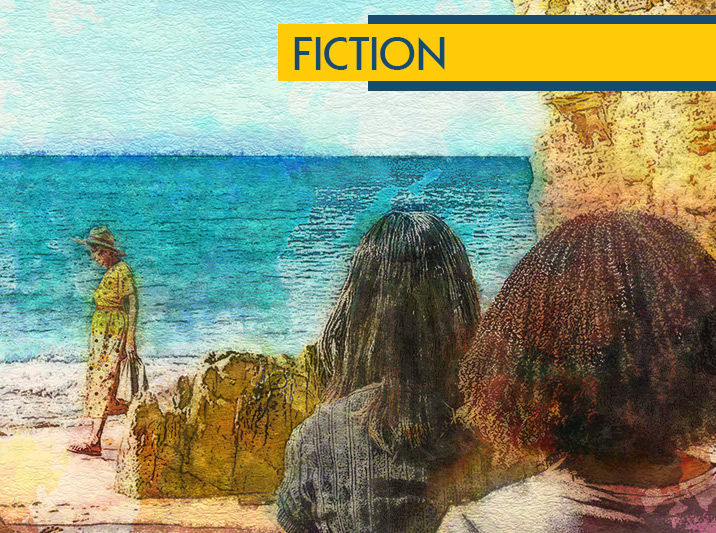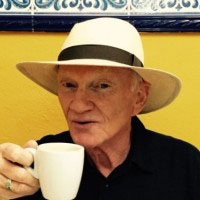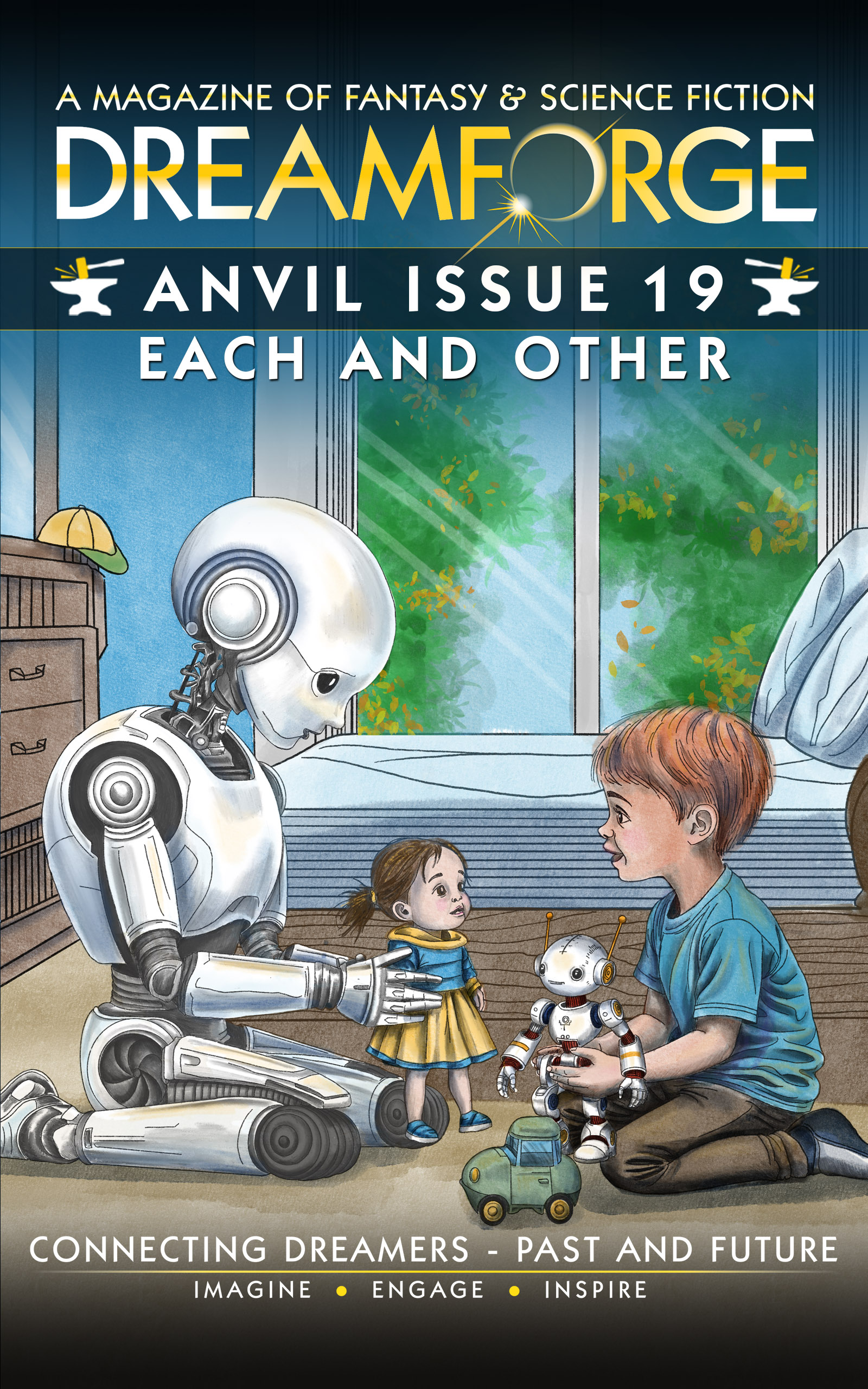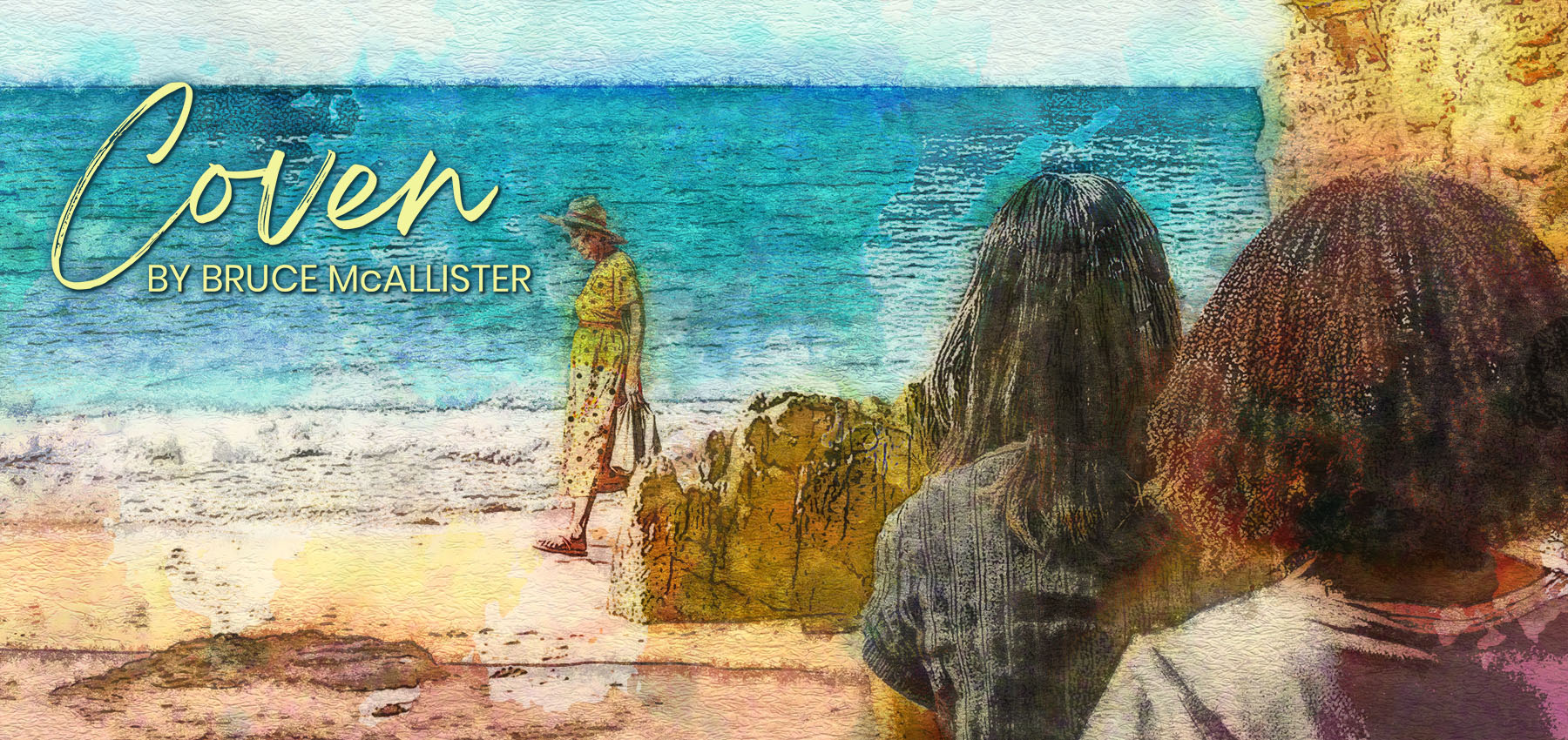
Recent quantum experiments
suggest that human consciousness
may be part of the fabric of the universe.
—Scientific American
We’re hiding in a big salty cave at the bottom of the sandstone cliffs, at sea’s edge, hoping —especially us girls— to see her do what she does on the sand. We don’t want to interrupt her —what she does saves the world— but we’ve traveled for weeks from our bay city in the north to see her, our group getting larger at each abandoned freeway or empty town or arroyo. The more of us there are —older kids, I mean— ones that are almost adult— the safer we are from the wild dogs and coyotes and the crazy, feral grown-ups who would steal from us, or worse.
Though they say they don’t, the boys do want to see her too. You can tell. Who wouldn’t want to see one of The Seven— the old women who, spread across the world, saved us when the shining ships, their weapons like blue ghosts, came down…and now keep saving us?
—
We’re rag-tag, dirty and smelly, but she’s not much to look at either, and no one knows her real name. We call her “Claire” when we talk about her because someone started to do it one day, like “Why not?”, and we kept using that name, but also because “the witch” seems unkind. That’s what people call The Seven. The Witches. But she isn’t a witch. She does what she does, I know from my dreams, not with spells, but with her mind and heart, what she wants for this world; and she is able to do this, I tell myself, because, if we’ll only let ourselves, we can with our hearts and minds touch the whole universe, become a part of its beautiful cloth, and know a power beyond what ordinary human lives know. Some of us can do this, touch it and become it and use it, but only a very few —only seven— can save a world.
“They’re one in a million,” people in the city say. Does this mean there are only seven million human beings left on Earth, or is that just an expression, and there are more, or even less? We have no one to ask.
What we call her doesn’t matter to her, I’m sure. We’ve talked about this. What matters to her is the world, we agree, and what she does here on the sand when it needs to be done.
She looks crazy. She limps down the beach toward us, leans down now and then, picks up shells and driftwood and even pieces of plastic —all things of our world— and puts them in an old cloth bag. Some things fall through holes in it when she starts walking again, but this doesn’t seem to bother her. It’s as if she knows she will have enough for what she needs to do even if she loses them.
She wears a ragged palm-frond hat that someone —maybe her, maybe someone else— made a long time ago to protect her skin from the sun.
If she knows we’re watching her, she pretends she doesn’t.
What do we really want, I wonder, coming all this way when so many —kinder adults, adults that can lead and make things and fix things, old fragile people, and young people like us— stick to the city because it can be safer there, with food and water and shelter and medicine, the ones they used to save me when my mother died and I was so sick. I don’t know about the others in our group. “We just want to see her,” they tell me, but whether that is the truth or all of it, I’m not sure. Why do I want to see her? When I close my eyes and ask, a voice says: To see her eyes. I sometimes think two of the other girls want the same— not just to see an old woman walking on the beach, knowing who she is and what she does for us, but to see her eyes.
I don’t know what that means —to see her eyes— and to do it I’d have to be closer, and by being closer maybe get in her way, and keep her from doing what she needs to do, and needs to do every day. They do it every day, people say, because every day the ships come again with their weapons.
She wears a faded cotton dress, the kind old women wore long before the day that changed everything. It has big flowers on it, yellow ones, and is torn because it may be the only thing she has. On her feet she has old leather-strap sandals someone has painted pink and painted messily. Did she paint them herself, or did she find them, just as I found the skirt, blouse and old shoes I’m wearing?
Head down, her bag in her right hand —she’s left-handed— she keeps her eyes on the sand and picks up what she needs. We’ve been watching her for an hour, and when she stops walking at last, we’ve almost used up our water from the plastic bottles and canteens we brought with us and are wondering where we will refill them. It is hot here. Someone says there’s water dripping through the sandstone not very far away, but I didn’t see it. Someone will have to go and look.
Why did she stop? She isn’t looking at us. She’s looking out at the sea, as if hearing something. But what?
My stomach growls, or is it the stomach of the young woman next to me, her hair as wild and dirty as mine, her clothes as torn? But food isn’t as important as water.
Where does the old woman get hers—her water? Does she have it somewhere in a cave and isn’t afraid it will be stolen because who would dare steal from one of The Seven?
In this heat I’m thinking strangely. I’m feeling very strange. The young woman’s face beside me is wide-eyed, not blinking. Is she feeling it, too, or is it thirst or hunger or something else?
Claire is reaching into her bag and pulling out, piece by piece, what she’s collected. Carefully. She inspects each item, head cocked, and I imagine her —she’s too far away for me to actually see it— pursing her lips and squinting against the sunlight that reflects from the sand. I squint, too, trying to see her eyes, but I can’t. I see only the darkness of her skin at this distance.
As she takes each thing from the bag, she leans over stiffly, a little wobbly, and places it on the sand next to another shell or piece of wood or plastic.
She’s making a circle on the sand. Her back is to us now, and the circle grows with each piece until it is maybe two strides across, and then she stops, stands as straight as she can, as if stretching, and looks at the sea again.
Why is she making a circle? We didn’t know about this. We were told only that she does what she needs to do at this beach, not how.
My heart is pounding, and why wouldn’t it?
Now she’s making a circle inside the first circle, a smaller circle, with smaller pieces. And when she is finished with this circle, she makes another, smaller one inside that one, with even smaller pieces. The circles aren’t perfect. The pieces are different shapes, and the distances between them aren’t the same, so the circles can’t be perfect, but this doesn’t seem to matter. What matters is that there in the bright sunlight, by the sea, and under a blue sky, she is making something. I remember now, from dreams, how this feels: to make something that is perfect even if it isn’t, on the sand of a beach somewhere, but I don’t know if I’m really feeling what she’s feeling doing it. How could I know?
The girl beside me —the one who really likes me— is looking up. She is looking up at the sky.
Something glints for a moment in the cloudless blue. Glints again.
Metal. Yes, metal.
I hear gasps and chatter around me, but the sound still doesn’t make the old woman look at us. She isn’t looking at the sky. She is looking only at the circles and the pieces she’s placed so carefully within them, as if each were a part of the world and all were needed to make the world whole again.
And then the old woman steps into the circles, stands there for a moment, and looks up at the sky.
And then the circles begin to move, actually move on the sand, each circle moving in the opposite direction.
They rise from the sand, the pieces. They rise, and at first they’re barely floating, but then they start to spin faster. They rise higher until they’re at her waist, then her shoulder, then her hat, blowing her dress like a sea wind, lifting the sand like a whirlwind.
She takes off her hat. You can see her face even in the blur of spinning, and she squints in the sunlight, never taking her eyes off the sky—
—as metal glints again, and again.
Everything —time and the world— stops. The spinning pieces stop spinning, but do not fall. Our breathing stops. The old woman doesn’t move.
And then the sky brightens as if the biggest bomb in the world has gone off, and we look away —the light hurts— but the old woman does not.
As the light fades, we look at the sky and wait for the metal again.
We wait a long time, and it doesn’t come.
The sky has returned to what it was. Blue and cloudless again, nothing more.
A voice says suddenly to me, and without words: You do what is right. You make a correction.
I don’t think the others have heard it. What it means, I’m not sure, but I think I’ve heard the words before, perhaps in a dream.
She has put her palm-frond hat back on and she’s looking at us.
I feel it again, so intensely that I’ve started to shake: You need to see her eyes.
Is she looking at me, or is it my imagination? Others stand beside me, watching her. She could be looking at them.
I take a step. I take another. Her face is still too far away for me to see her eyes.
I look back. A few feet behind me the two other girls are following.
I look at the old woman again and do not look away as I walk toward her. She doesn’t look away either, and when I’m to her, when I can see the bright pink sun cancers on her face, the stringy gray hair under her hat, the food and other stains on her unwashed dress, and the bigger sun cancers on her hands, I stop.
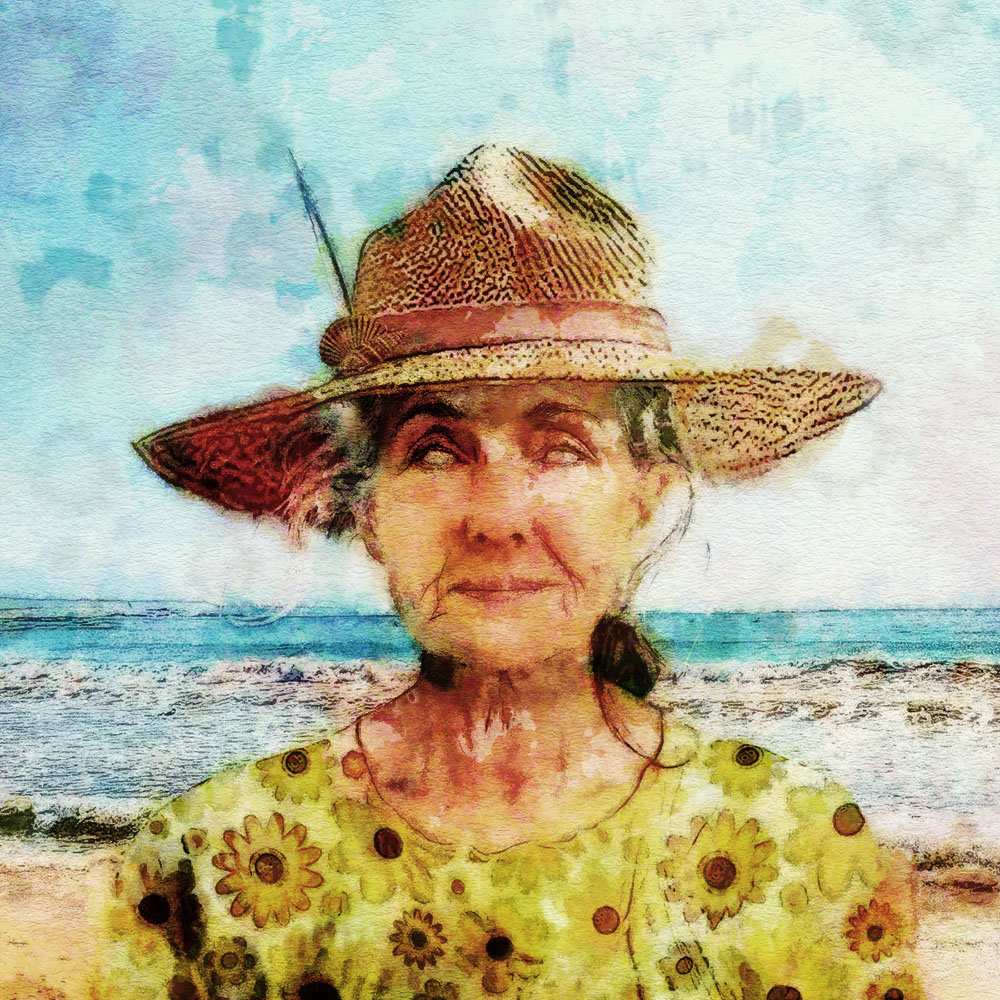
I see her eyes now. They are cloudy, nearly white, and have been that way for a long long time.
They see without seeing.
I hear the two other two girls stop behind me. I hear their breathing.
The old woman looks away from me —to the two young women behind me— and makes a sound that could be a gentle “No….” but whatever the sound is, she is shaking her head slowly from side to side. She isn’t smiling, but her face isn’t unkind. It is simply saying to the two girls You will not be needed.
I hear them stop breathing behind me. I hear them leave.
I have not let my eyes leave hers.
She hands her empty bag to me and in a hoarse voice not accustomed to talking to people, or even herself, she says:
“I will show you how it is done, my child.”
As I take the bag, the words come back to me, and I know —because I’ve known it my whole life, I know now— what right means and what correction means, and what I must do, to make happen what needs to happen when something glints in the sky. I remember the time I somehow made wild dogs in the city lie down and leave a little girl alone, so I could take her into a building, and thought it was only luck. I remember a boy with a knife who wanted to hurt me and how he dropped it when I looked at him and made a motion with my hands. I remember other times when, I see now, I made a correction because it was the right thing to do.
I look at her and she looks back. She is old, much older than I thought, her body beaten by time and the very world she loves so much. Her bones hurt her. Soon she will not be able to walk and gather the things she wants on the sand. And the cancers on her skin and the problem with her heart may take her even before then.
We have our bodies until we no longer need them, she is saying to me.
You are young, she is saying. Your body will be able to do what is needed here when I am gone.
I understand, I say, and, though I am about to cry, it is without words that I say it because words are no longer needed when everything is a perfect circle on the sand.


